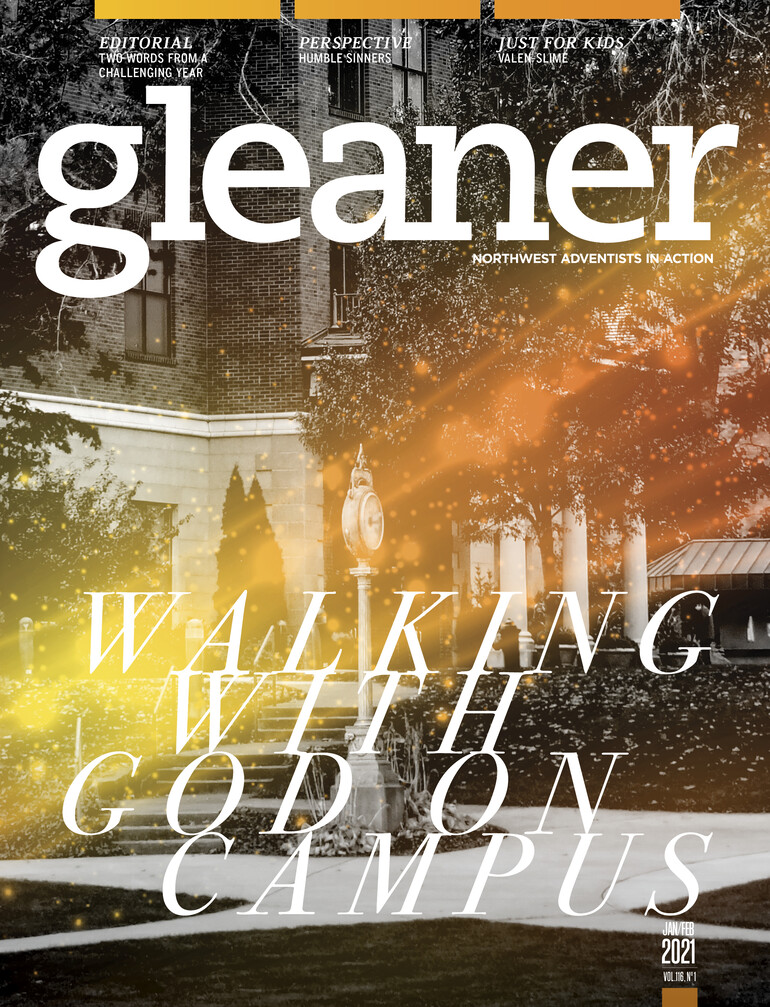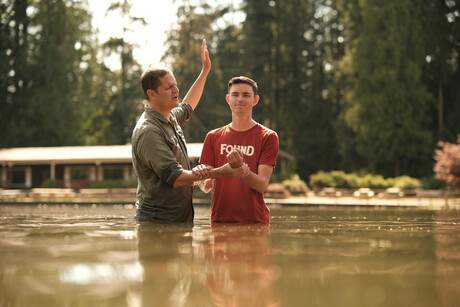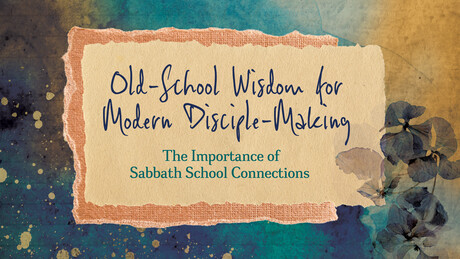Students Find Meaningful Spiritual Connection at Walla Walla University
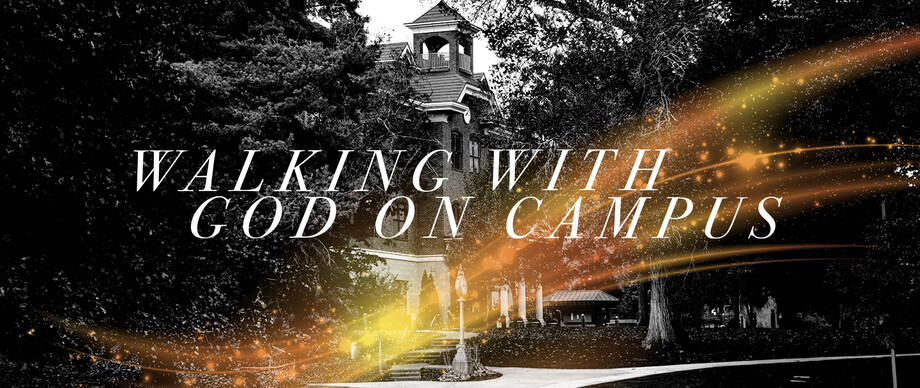
At Walla Walla University we seek to create a campus environment where a growing, personal walk with God is nurtured in each student. This inspires and drives our work, play and study. Moments of corporate worship, service to others and personal communion with God give meaning to our pursuits and set WWU apart as a distinctly Christian, Seventh-day Adventist campus.
Yet during the coronavirus pandemic, we've encountered new challenges. “We’ve never faced so many obstacles to gathering together to grow in our faith,” says Albert Handal, WWU campus chaplain. Handal says students are hungering for God like never before and it would mean the world to our campus to know that Adventists throughout the Pacific Northwest are praying for us. “It’s easier to finish a race when you hear the cheers of the crowd,” he explains. “Everyone knows somebody from their town or local church who is enrolled here — I’d say that person you know is exactly who God is calling you to adopt with your prayers and cheers of encouragement.”
As we begin this new year, we are excited to share a few of the inspiring spiritual activities happening on campus to help our students, faculty and staff grow in their spiritual walks, experience genuine community, and magnify the love of Jesus on campus and around the world.
Kim Strobel, WWU university relations supervisor
Warmth and Restfulness of Vespers Continues Through COVID-19
Every Friday evening the University Church lobby sees students streaming into the sanctuary to welcome the Sabbath together. These days every student wears a mask and comes early to snag a seat, since they are limited, but thankfully the powerful atmosphere of warmth and fellowship remains the same. Senior computer science major and vespers coordinator Luke Irvine [pictured below] says, “My favorite part is having the entire sanctuary packed full of people worshipping and singing to God and then the loud hum of all those people mingling and having a great time together after vespers.”

Vespers provides an important opportunity for the campus family to worship together as a community, with 200 students attending this fall under social-distancing restrictions. Students attending classes from off campus and those unable to attend in person can easily follow the service from the YouTube livestream and foster that important sense of community connection.
The pandemic has impacted the size of the gathering and changed some of its components. However, the fellowship created by a communitywide worship service is still impactful. Students often stay long after the service connecting with one another. Vespers floor manager Claire Balli [pictured below], sophomore social work and theology double major, says, “It is such a great time to connect and worship with friends and people I hadn’t seen in a while without the stress of schoolwork.”
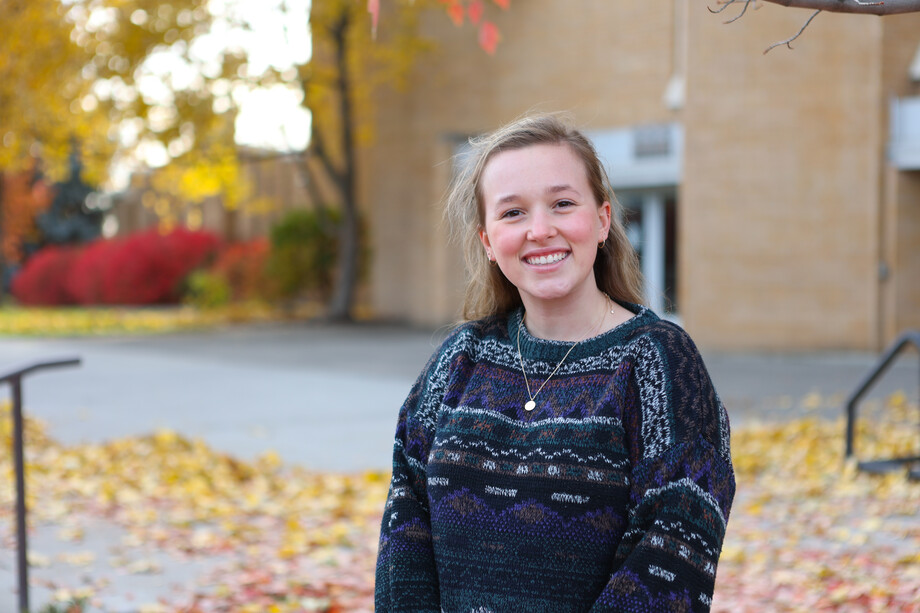
Students also practice taking part in the church community. They are invited to participate in the worship bands that prerecord music to minimize contact on stage, as well as offer prayer, introduce the speaker and play the opening shofar blast that signals the start of Sabbath. “These short pieces also lend themselves to online students, as students can record themselves ahead of time,” says Irvine. Others are able to help as ushers or sound technicians. Part of the power of vespers comes from this intentional emphasis on student leadership and participation.
The new look of vespers has also taught students about resilience. “We have been able to grow in things like flexibility and creativity in order to create a vespers that is as accessible and enjoyable to students as possible,” says Balli of their work to continue vespers during the pandemic.
Despite some changes brought on by COVID-19 restrictions, vespers continues to be an important part of spiritual life on campus. “The people who are able to come seem to enjoy themselves, and I’ve heard good spiritual conversations afterward, which is so encouraging,” says Irvine.
Kelsi Nash, WWU university relations student writer
ReNew Sabbath School: A Safe Place to Grow

ReNew is a student-led class on campus that focuses on small group discussions and creating community through music. This is my second year being involved with ReNew as part of the leadership team, and it has been a huge blessing to get to work with a team of dedicated students from a variety of majors and backgrounds. We try to focus on diversity, and most of our leadership team this year is female.
ReNew came into my life at a point where I was struggling a bit spiritually in the aftermath of an abusive situation with a family at my home church. Rather than drawing me away from the semiconservative Adventism I had grown up in, ReNew gave me a place to grow in connection with other young people, many of whom were asking the same questions I was.
To me, ReNew is a safe place to ask those questions about faith and how it fits into our rapidly changing society and post-Christian world. To me, ReNew is more than a community of faith; it’s family.
Kiersten Ekkens, junior strategic communication major
Circle Church: Creating Connection and Conversation by Uplifting Jesus
Circle Church is a contemporary worship service held Saturday mornings and led entirely by students. The current leadership team includes John Aitken, senior theology major, and Joshua Peinado [pictured below], sophomore strategic communication major. Circle Church focuses on giving students ownership over their religious community.
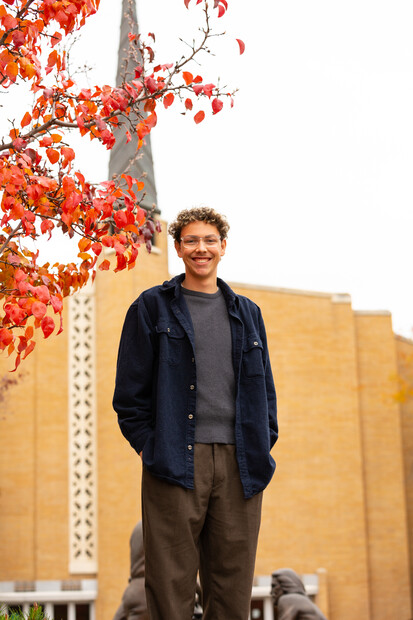
“You can become a volunteer. You can have input. We want each and every one of the students to feel like they have a church home, and they are an integral part of that home,” says Aitken. Students can be involved in a multitude of ways, including through speaking. Aitken says they often follow a given theme each quarter, but it is also open so students can share what is on their heart and feel led to share by the Holy Spirit.
One goal of having students lead in all parts of the service is building a sense of belonging. The Circle Church team works to create a space where everyone is willing to join the community and can help according to their spiritual gifts.
The Circle Church leadership team believes that when students feel ownership over something, they will want to invest in it more. “We prayed the Holy Spirit would create a culture of ownership in the student body, because we didn’t feel like an awesome team could do that. We felt like that was only something the Holy Spirit could do,” says Aitken.
Aitken and the team have seen positive results from that investment in the people who help each week, whether preaching, singing, offering prayer, or collecting offerings. Volunteers also suggest new methods of outreach and form small groups and prayer nights. “Circle Church is not just a program that happens once a week, but it’s a community where volunteers see a need and feel the call to do something,” says Aitken [pictured below].
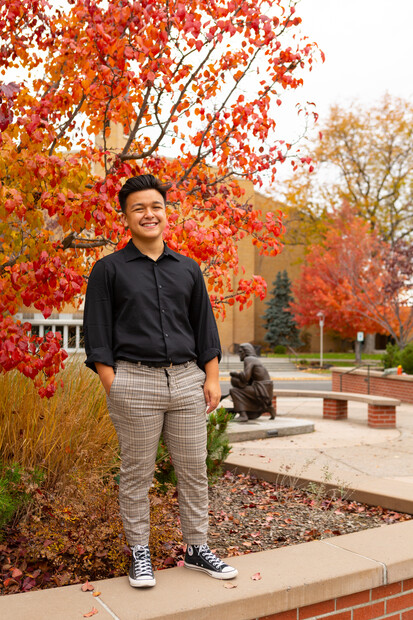
During the pandemic, those involved in the service have had to adapt their ministry to changing health regulations, first by distancing and wearing masks, then by meeting outside, and now moving entirely online. Services are streamed on Instagram Live and through YouTube so students can attend no matter where they are.
Students are glad to find connections with others despite the changes. “I felt like we were able to worship as a community together and that’s something that I don’t feel very much during this time. So for me, that was a real blessing,” says Aitken.
“We’ve tried to make it a pretty casual, inviting experience,” says Peinado. “You don’t have to try to dress a certain way. You know there’s a bit of something for everyone. You can just come with your friends and get some food, get some good music, and get the good Word, and hopefully have something to discuss afterwards.”
No matter what a student comes for there is always one central focus, and in fact, that is how Circle Church got its name: “When Jesus is at the center of what you’re doing and you’re all coming around Jesus, everyone is equal and connected,” says Aitken. Jesus is at the center of their worship circle.
Kelsi Nash, WWU university relations student writer
Berean Fellowship: Finding Family in Fellowship
Rom. 12:4–5 says, “For just as each of us has one body with many members, and these members do not all have the same function, so in Christ we, though many, form one body and each member belongs to all the others.”
This verse exemplifies the presence and the atmosphere the Berean Fellowship provides. From the African American gospel experience to the testimonies and praise, Berean Fellowship has become my second family. Regardless of one’s race, gender or age, the family aspect Berean presents provides a sense of belonging and warmth.
Nyasha Taruvinga, sophomore social work major
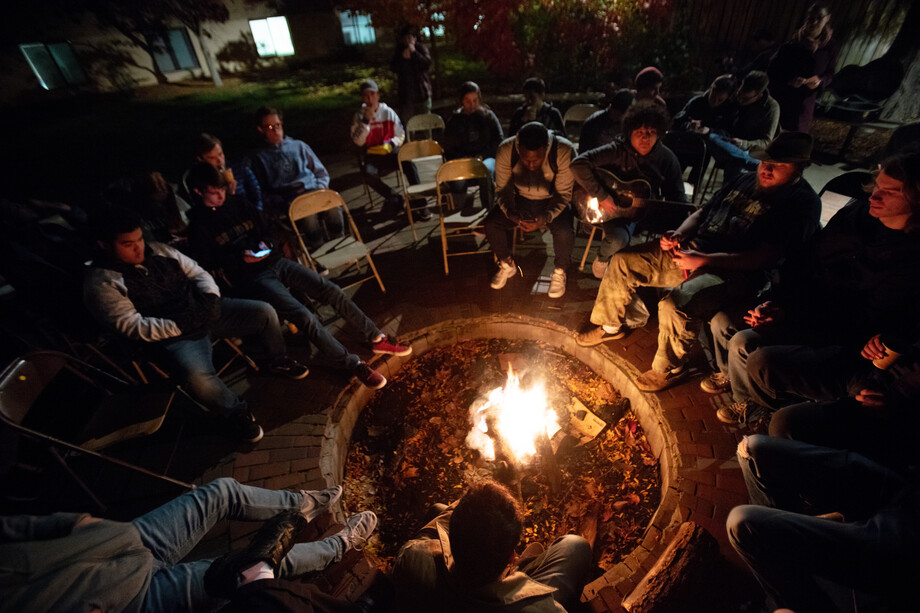
Hispanic Ministries: Students Create Fun, Safe Place to Share God and Culture
The Hispanic ministries team works to share God and Hispanic culture on the Walla Walla University campus under the direction of Sarah Palacios [pictured below], junior forensic psychology major, and Juan Ruiz, junior business administration major.
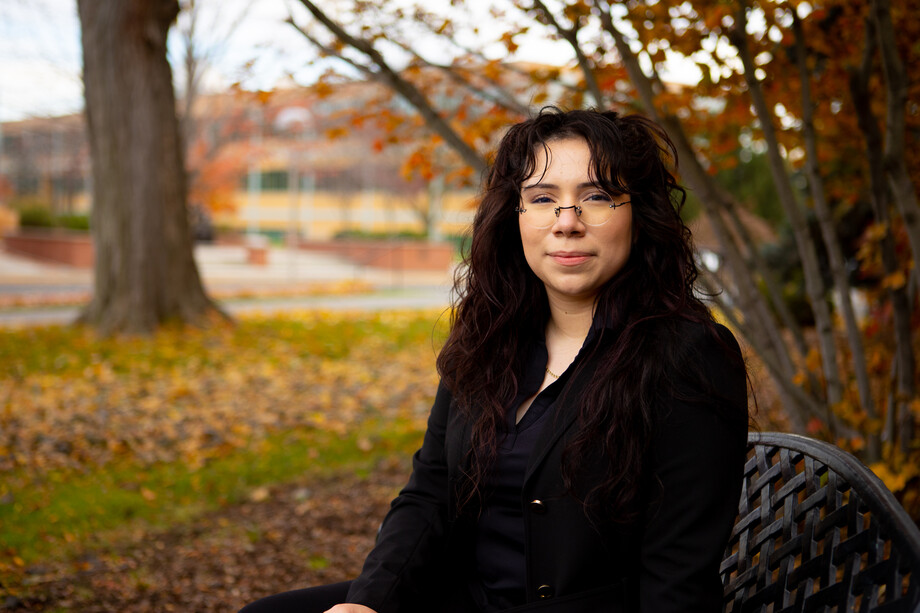
“We offer a comfortable, safe place where people can come and enjoy Hispanic culture,” says Palacios. “We are open to everyone, not only Hispanic and Latinx people. To me, having this opportunity shows people that the school cares and wants to pay attention to other cultures. It shows diversity is appreciated and important.”
An important part of the presence of Hispanic ministries on campus is weekly worship services, which provide opportunities for everyone to get involved. Students can lead song service or volunteer to speak, and gatherings often include games and activities that can help people relax and make new friends.
“Our interaction with everyone is fun and real,” says Palacios. “We try to always go out of our way to make everyone feel included and to create a comfortable atmosphere.”
Team leaders have found that worshipping with others provides moments to share joys and struggles. Through this interaction there is opportunity for people to learn about Hispanic culture. “Worship brings our community together,” says Palacios.
While students from any background can be involved with Hispanic ministries, the pandemic has created challenges. Many WWU students took classes from home through distance learning during fall quarter and some will into winter quarter as well. Strict COVID-19 protocols on campus don’t allow for large group gatherings.
Nevertheless, Palacios and Ruiz [pictured below] are persisting with their vision and finding ways to reach students who are not on campus right now. They hold meetings on Instagram Live and Microsoft Teams and are finding ways to create opportunities for students who are off campus to lead out and share during programs.
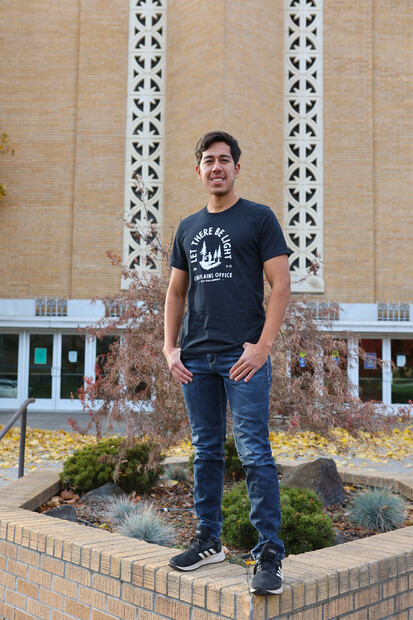
Whether meeting online or in person in small groups, the power of what Hispanic ministries is accomplishing on campus comes from the shared experience of a close-knit community. Palacios seems uniquely fitted for her leadership role. “I love reaching out to others and making them feel important and included,” she says. “I want everyone to feel like they have a place and are not forgotten.”
It is no wonder Hispanic ministries and the number of students with Hispanic heritage are growing at WWU. Palacios says, “We are hoping to make everyone feel comfortable and help make our community strong and united.”
Kim Strobel, WWU university relations supervisor
Connecting and Growing Through Small Groups
While worship services have an important place, sophomore theology major Parker Leclerc [pictured below] also chooses to participate in one of several small group Bible studies. Each week, he and five other WWU students dissect a passage of Scripture and discuss the questions it poses.
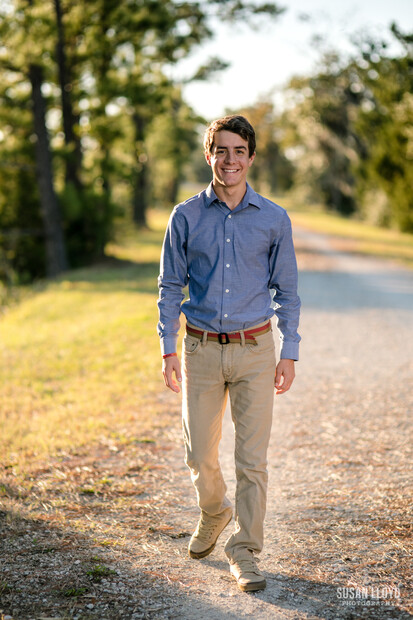
“I love that it is so Bible-based,” says Leclerc. “Worship services are super important because they encourage an abstract relationship, but for me small groups make it more concrete. It forces me to ask questions about my spiritual walk, why I believe, what is my foundation.”
For Leclerc, being able to actively participate makes spirituality more tangible. “Our small group lets us actively participate in getting closer to God and to others,” he says.
Leclerc adds that his small group also builds personal connections with his friends. He sees his small group as a safe space not only to study the Bible but to share in each other’s struggles and experiences. Each week they start their meeting by checking in on one another.
He noticed he has started to see some of his personal shortcomings by articulating his experiences. “Everyone sees who I am, so I see myself too,” says Leclerc. The support and encouragement from his friends motivates him to grow stronger in his walk with God.
Kelsi Nash, WWU university relations student writer
Worship Opportunities
Available to students each week.
Heubach Worship - Morning worship
Small Groups - Exploring the Bible in depth
The Prayer House - Open daily for worship and prayer
OPS/AGA Worship - Worship in the residence halls
Hispanic Ministries - Worship and outreach
CommUnity - Weekly all-campus gathering
Prayer Meeting - Tuesday night meal, Bible study and prayer
Residence Hall Worship - Organized by each hall resident assistant
Fireside Worship - Songs and stories by the fire
Vespers - Friday night campus gathering
Afterglow - Singing after vespers
ReNew - Sabbath School class exploring biblical themes
Defending the Faith - Sabbath School class on Christian apologetics
Circle Church - Contemporary church service
Berean Fellowship - Church service organized by Black Christian Student Fellowship
Sabbath Outreach - Students connect with the community
University Church - Contemporary and traditional worship options
(Some options are on hiatus during COVID-19 restrictions.)





